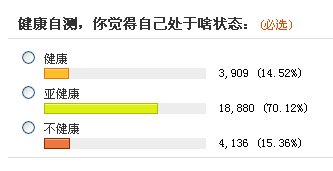短期应激对免疫系统有帮助
For years, researchers have found that chronic stress has negative effects on the body. But a new study suggests that there may be instances where short-term stress may help mobilize the immune system.
The study, which used mice, suggests that short periods of stress - typically no longer than a few hours - may even be beneficial, according to Firdaus Dhabhar, co-author of the study and an assistant professor of oral biology at Ohio State University.
The research appears in the March 5 online edition of the journal Proceedings of the National Academy of Sciences. It will also be in the March 14 print issue of the journal.
It seems that short periods of stress enhance the immune system’s response to foreign invaders, such as bacteria, viruses or even chemicals. During a stressful situation, immune cells travel to parts of the body that might be compromised because of the stress.
For example, the skin may be more vulnerable to wounding if an animal is already under stress.
The researchers showed that exposing the skin to a foreign substance just after a brief period of stress caused a more robust immune response. Researchers call this the delayed-type hypersensitivity (DTH) response.
"We believe that in many situations of acute stress, the body prepares the immune system for challenges such as wounds or infections," Dhabhar said.
"Immune function may actually be boosted under these conditions. The immune system may respond to warning signals - such as stress hormones - that the brain sends out during stress. These signals prepare the body to deal with the consequences of stress."
Dhabhar and his colleagues studied the role of gamma interferon in regulating the immune-enhancing effects of stress. Gamma interferon is one of a group of immune system hormones called cytokines. Cytokines regulate immune responses.
"They call troops (immune cells) to the site of the invasion, then orchestrate an immune response at the site of the battle," Dhabhar said. He added that gamma interferon is vital for summoning and activating immune cells to the site of immune reactions.
The researchers predicted that if gamma interferon was important for regulating the stress-induced enhancement of the skin’s immunity, then removing the hormone from the system would eliminate these stress-induced enhancement effects.
They examined the effects of stress on the immune response of mice that had normal gamma interferon function and mice that had deficient gamma interferon function.
To test each animal’s immune response following short-stress, the researchers shaved a small patch of fur from each mouse’s back. The researchers then applied a substance to each of the shaved areas. The substance, dinitro fluorobenzene (DNFB), mimics an immune response like that seen during a skin test for tuberculosis.
A week later, half of the mice were restrained in small wire mesh containers for two-and-a-half hours, while the other half were left undisturbed in their cages.
"Restraint stress is thought to be mostly psychological," Dhabhar said. "It may trigger a response similar to the collapse of an animal’s burrow - the mice perceive confinement and become stressed."
After the restraint period, the researchers applied DNFB to the right ear of each mouse in the study. Ear lobe thickness had been measured at the beginning of the experiment.
Measurements were taken every day for eight days after DNFB was applied to gauge the extent of the infection - just like a physician measures the increase in diameter of a tuberculin skin reaction.
The researchers noted a sizable increase in ear thickness in the stressed mice that had normal gamma interferon. By the second day after the restraining period, the right ears in these mice had swelled to an average of 60 percent larger than their initial size. This meant that more immune system cells were arriving at the site where the DNFB had been applied, thereby enhancing the DTH response.
This translates to an enhanced response to acute stress, the researchers said. By comparison, the ear size of the mice that were not stressed increased only about 30 percent by the second day.
In contrast, mice lacking gamma interferon did not have the same immune response. Of the mice in this group that were stressed, ear size increased to about a maximum of 35 percent of the original size. The ear thickness of the non-stressed mice in this group increased by about 25 percent.
"The stressed mice with normal gamma interferon function showed a significant enhancement of the skin’s immune response after the DNFB was applied to their ears," Dhabhar said. "The mice that lacked gamma interferon function failed to show the same immune-enhancing effects of acute stress.
"The absence of gamma interferon was very noticeable following the restraining period and the application of the antigen," Dhabhar said. "The lack of gamma interferon seemed to eliminate the stress-induced enhancement of the skin’s DTH response."
Dhabhar co-authored the study with Abhay Satoskar and John David, both with the department of immunology and infectious diseases at the Harvard School of Public Health; Horst Bluethmann, of F. Hoffmann L-Roche AG, Switzerland; and Bruce McEwen, of the laboratory of neuroendocrinology at Rockefeller University.
A grant from the John D. and Catherine T. MacArthur Foundation supported this research.
- 两性
- 男人
- 女性
- 母婴
|
· 处女座的特点 · 处女座最佳配对星座 · 2010年处女座运势 · 处女座女人的爱情 · 如何追处女座女人 · 处女座女人的特点 · 处女座女人 · 处女座男人喜欢的女人 · 如何对付处女座男人 |
|
· 怎样看待遗精 · 什么是滑精 · 什么是梦遗 · 什么是干燥性闭塞性龟头炎? · 前列腺炎检查 · 包皮手术过后多久可以性生活 · 早泄是不是跟包皮过长有关? · 早泄等于射精过快吗? · 体外射精有什么害处 |
|
· 女性经期切记将绿茶挡在门外 · 一个流氓和妓女的故事 · 最唯美的10首中国情诗 · 娇妻玩合租 结果引火烧身 · 男人必须了解女人的一些事 · 当女朋友被领导叫去陪酒 · 易让男人退避三舍的10类女人 · 老男人为什么招小女人的喜欢? · 10招看穿男人的爱情心理 |
|
· 春季合理喂养婴儿健康指南 · 如何正确使用空调保证健康 · 让宝宝接受保姆的三大招 · 哪些产妇需做会阴侧切 · 导致分娩时难产4因素 · 看美国准妈人性化孕产经历 · 准妈妈如何预防春季感冒? · 胎盘和脐带的功能与重要性 · 烟、酒和咖啡对胎儿的影响 |






